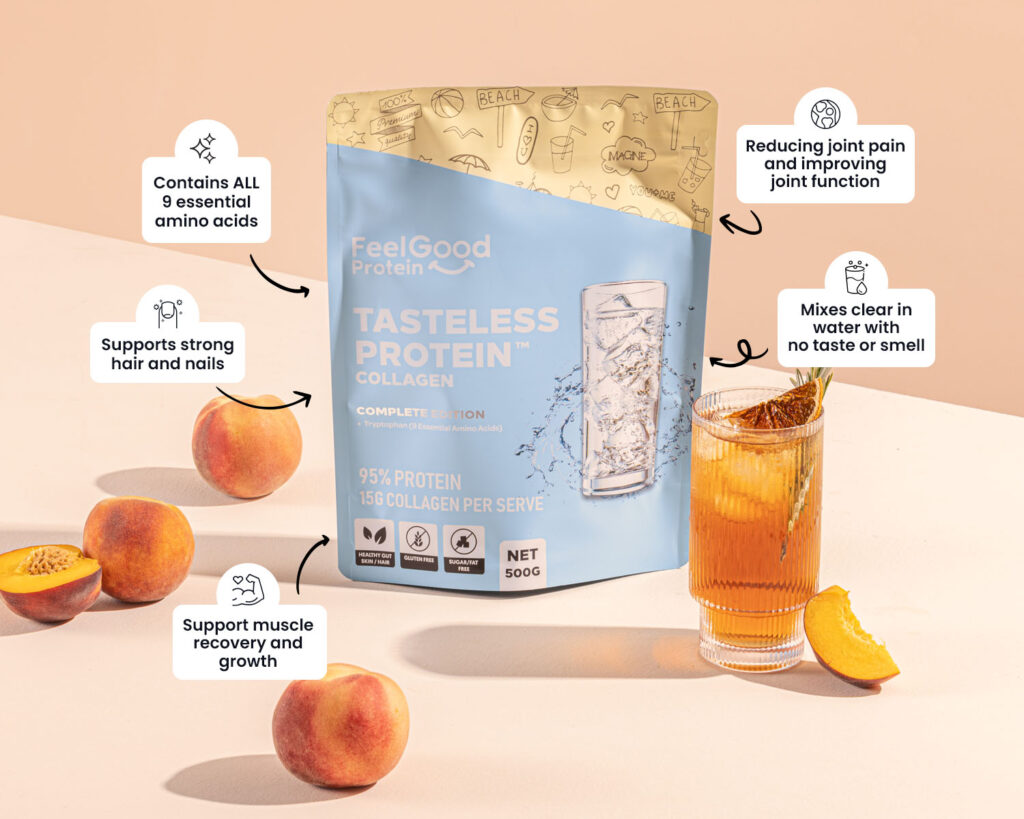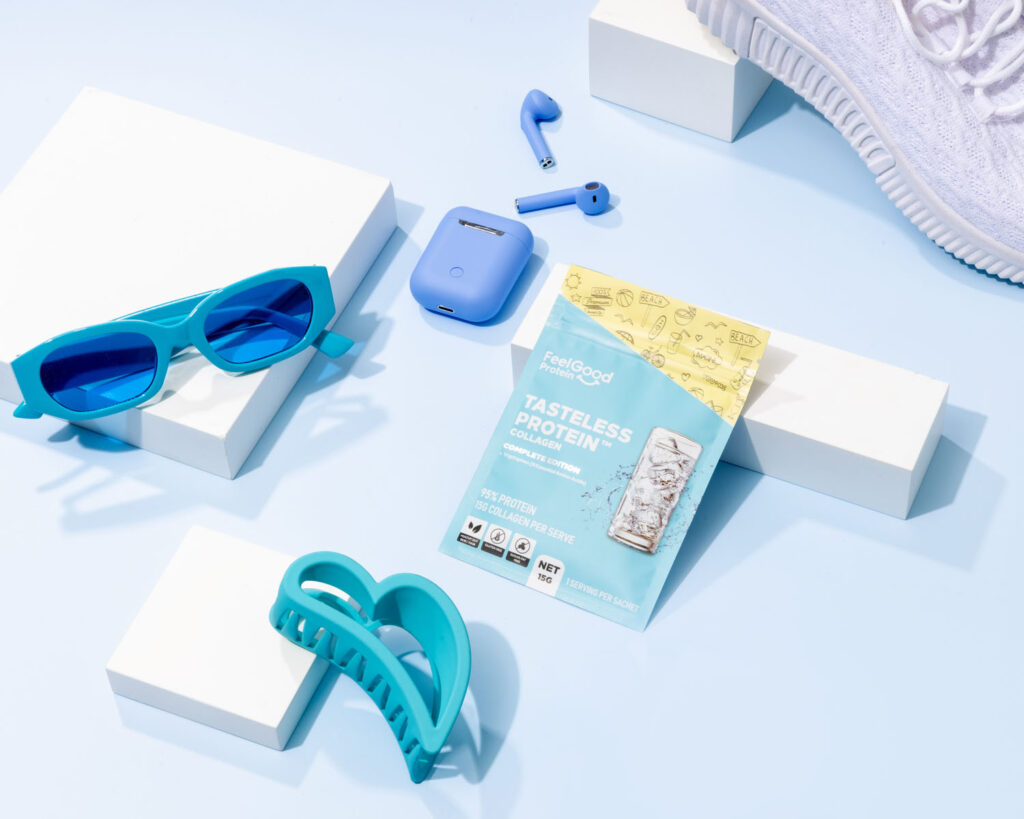Blog
Tasteless Protein Collagen: Experience the Benefits Over Whey Protein
When searching for the ideal protein supplement, it’s important to consider the nutritional content as well as the unique benefits and suitability for your lifestyle. In this article, we’ll explore why Tasteless Protein Collagen is a great choice compared to whey protein, highlighting its complete protein profile, exclusive advantages, and versatility.
Nutritional Content: The Complete Protein Edge
Tasteless Protein Collagen boasts a complete protein profile, meaning it contains ALL nine essential amino acids, including tryptophan. This sets it apart from many collagen supplements that lack a complete protein profile. Although whey protein also provides a complete protein, the amino acid composition of collagen offers distinct benefits.
Collagen is rich in glycine, proline, and hydroxyproline, vital for connective tissue health. While whey protein contains higher concentrations of branched-chain amino acids (BCAAs) like leucine, isoleucine, and valine, the collagen-specific amino acids provide unique advantages that can’t be found in whey protein.

Exclusive Benefits of Collagen Protein, Backed by Clinical Research
- Joint Health
Collagen is particularly beneficial for joint health, providing the necessary amino acids for cartilage production and maintenance[1][4]. In a 24-week study on athletes with activity-related joint pain, collagen hydrolysate supplementation was shown to be effective in reducing joint pain and improving joint function[1]. Another study showed that collagen hydrolysate improved joint pain in people with osteoarthritis[4]. In contrast, whey protein doesn’t offer the same level of joint support. - Skin, Hair, and Nail Health
Collagen promotes skin elasticity, hydration, and overall skin health[2][5]. It also supports strong hair and nails. A double-blind, placebo-controlled study found that oral supplementation of specific collagen peptides had beneficial effects on human skin physiology, including improved elasticity and hydration[2]. Another study found that collagen peptides improved skin hydration, elasticity, and wrinkling in middle-aged women[5]. Whey protein cannot provide these specific benefits. - Gut Health
Collagen contributes to improved gut health by strengthening the intestinal lining[3][6]. A review of studies found that collagen peptides can modulate the function of the intestinal barrier and promote gut health[3]. Animal studies have shown that collagen peptides can also protect the gut against inflammation and oxidative stress[6]. Whey protein doesn’t offer the same gut health benefits. - Muscle Recovery and Growth
Both Tasteless Protein Collagen and whey protein support muscle recovery and growth. However, collagen’s unique amino acid profile and its role in connective tissue health make it a well-rounded choice for overall muscle and joint support[7]. Collagen supplementation has been shown to increase muscle mass and strength in older adults with sarcopenia[7].

Versatility and Suitability: The Collagen Advantage
- Digestibility
Collagen is generally easier to digest than whey protein, making it a better option for those with sensitive stomachs or lactose intolerance. - Versatility in Usage
Tasteless Protein Collagen is truly tasteless, allowing you to add it to any food or beverage without altering the taste. This is particularly beneficial when mixing with hot liquids like coffee, as whey protein tends to clump and not mix well in such conditions. The tasteless nature of collagen makes it an ideal addition to various recipes and preferences. - Dietary Restrictions
Tasteless Protein Collagen is sourced from grass-fed, pasture-raised cows, making it a suitable option for those who prefer natural, minimally processed supplements. For vegetarians or those with dairy allergies, whey protein may not be suitable.

Conclusion
For many people, Tasteless Protein Collagen emerges as a superior choice over whey protein due to its unique benefits, such as joint health, skin, hair, and nails support, gut health, and versatility in usage. Its ability to mix well with hot liquids and its easily digestible nature make it a perfect addition to your health and wellness journey.
Backed by clinical research, Tasteless Protein Collagen is an excellent alternative to whey protein for those seeking a versatile, tasteless and easily digestible protein supplement that supports joint health, skin, hair, and nails. Shop our Tasteless Protein Complete Edition today and experience the difference for yourself.

References
- Clark, K. L., Sebastianelli, W., Flechsenhar, K. R., Aukermann, D. F., Meza, F., Millard, R. L., … & Albert, A. (2008). 24-Week study on the use of collagen hydrolysate as a dietary supplement in athletes with activity-related joint pain. Applied Physiology, Nutrition, and Metabolism, 33(3), 470-477.
- Proksch, E., Segger, D., Degwert, J., Schunck, M., Zague, V., & Oesser, S. (2014). Oral supplementation of specific collagen peptides has beneficial effects on human skin physiology: a double-blind, placebo-controlled study. Skin Pharmacology and Physiology, 27(1), 47-55.
- Chen, Q., Chen, O., Martins, I. M., Hou, H., Zhao, X., Blumberg, J. B., & Li, B. (2017). Collagen peptides ameliorate intestinal epithelial barrier dysfunction in immunostimulatory Caco-2 cell monolayers via enhancing tight junctions. Food & Function, 8(3), 1144-1151.
- Benito-Ruiz, P., Camacho-Zambrano, M. M., Carrillo-Arcentales, J. N., Mestanza-Peralta, M. A., Vallejo-Flores, C. A., Vargas-López, S. V., … & Sánchez-Andrade, R. (2009). A randomized controlled trial on the efficacy and safety of a food ingredient, collagen hydrolysate, for improving joint comfort. International journal of food sciences and nutrition, 60(sup2), 99-113.
- Asserin, J., Lati, E., Shioya, T., & Prawitt, J. (2015). The effect of oral collagen peptide supplementation on skin moisture and the dermal collagen network: evidence from an ex vivo model and randomized, placebo-controlled clinical trials. Journal of cosmetic dermatology, 14(4), 291-301.
- Song, H., Meng, M., Cheng, X., Li, B., & Wang, C. (2020). The effect of collagen peptides on oxidative stress, inflammation and intestinal barrier function in a mouse model of dextran sulfate sodium-induced colitis. Food & Function, 11(1), 740-750.
- Zdzieblik, D., Oesser, S., Baumstark, M. W., Gollhofer, A., & König, D. (2015). Collagen peptide supplementation in combination with resistance training improves body composition and increases muscle strength in elderly sarcopenic men: a randomised controlled trial. The British Journal of Nutrition, 114(8), 1237-1245.
 |
|





